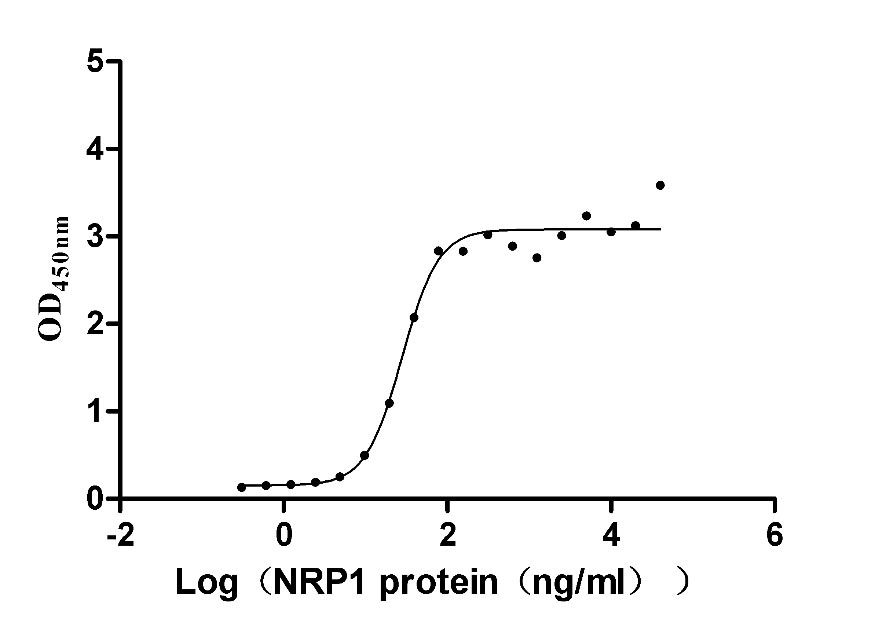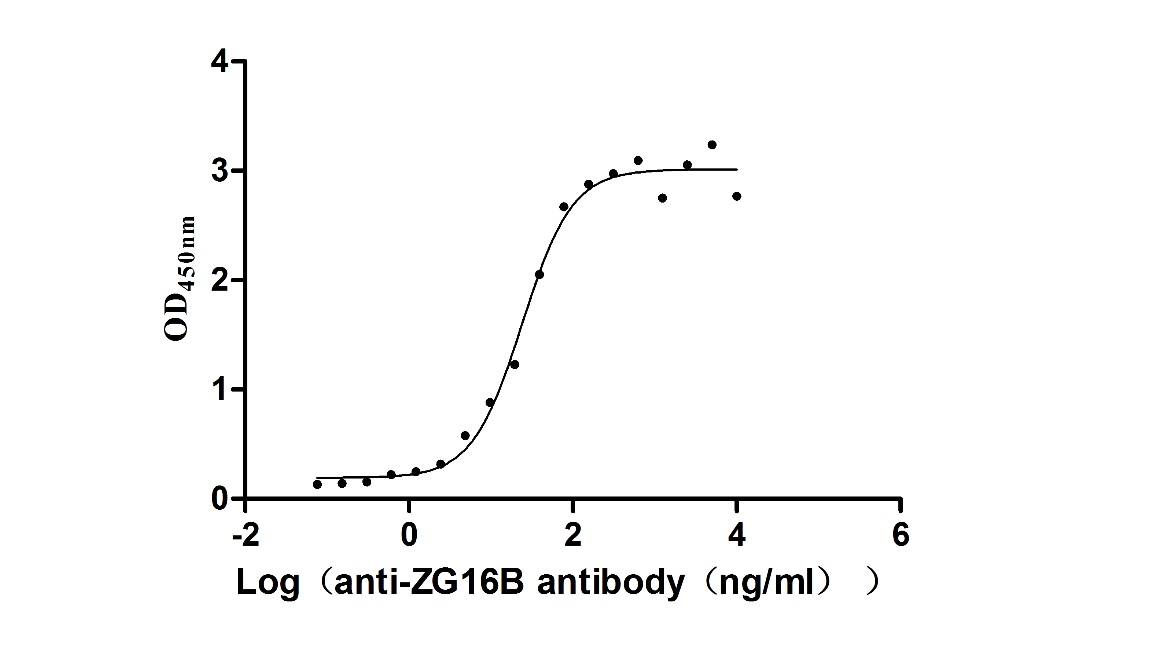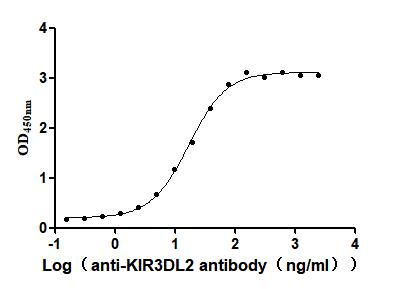Recombinant Human TBC1 domain family member 24 (TBC1D24)
-
中文名称:人TBC1D24重组蛋白
-
货号:CSB-YP890752HU
-
规格:
-
来源:Yeast
-
其他:
-
中文名称:人TBC1D24重组蛋白
-
货号:CSB-EP890752HU
-
规格:
-
来源:E.coli
-
其他:
-
中文名称:人TBC1D24重组蛋白
-
货号:CSB-EP890752HU-B
-
规格:
-
来源:E.coli
-
共轭:Avi-tag Biotinylated
E. coli biotin ligase (BirA) is highly specific in covalently attaching biotin to the 15 amino acid AviTag peptide. This recombinant protein was biotinylated in vivo by AviTag-BirA technology, which method is BriA catalyzes amide linkage between the biotin and the specific lysine of the AviTag.
-
其他:
-
中文名称:人TBC1D24重组蛋白
-
货号:CSB-BP890752HU
-
规格:
-
来源:Baculovirus
-
其他:
-
中文名称:人TBC1D24重组蛋白
-
货号:CSB-MP890752HU
-
规格:
-
来源:Mammalian cell
-
其他:
产品详情
-
纯度:>85% (SDS-PAGE)
-
基因名:TBC1D24
-
Uniprot No.:
-
别名:TBC1D24; KIAA1171; TBC1 domain family member 24
-
种属:Homo sapiens (Human)
-
蛋白长度:full length protein
-
表达区域:1-559
-
氨基酸序列MDSPGYNCFV DKDKMDAAIQ DLGPKELSCT ELQELKQLAR QGYWAQSHAL RGKVYQRLIR DIPCRTVTPD ASVYSDIVGK IVGKHSSSCL PLPEFVDNTQ VPSYCLNARG EGAVRKILLC LANQFPDISF CPALPAVVAL LLHYSIDEAE CFEKACRILA CNDPGRRLID QSFLAFESSC MTFGDLVNKY CQAAHKLMVA VSEDVLQVYA DWQRWLFGEL PLCYFARVFD VFLVEGYKVL YRVALAILKF FHKVRAGQPL ESDSVKQDIR TFVRDIAKTV SPEKLLEKAF AIRLFSRKEI QLLQMANEKA LKQKGITVKQ KSVSLSKRQF VHLAVHAENF RSEIVSVREM RDIWSWVPER FALCQPLLLF SSLQHGYSLA RFYFQCEGHE PTLLLIKTTQ KEVCGAYLST DWSERNKFGG KLGFFGTGEC FVFRLQPEVQ RYEWVVIKHP ELTKPPPLMA AEPTAPLSHS ASSDPADRLS PFLAARHFNL PSKTESMFMA GGSDCLIVGG GGGQALYIDG DLNRGRTSHC DTFNNQPLCS ENFLIAAVEA WGFQDPDTQ
-
蛋白标签:Tag type will be determined during the manufacturing process.
The tag type will be determined during production process. If you have specified tag type, please tell us and we will develop the specified tag preferentially. -
产品提供形式:Lyophilized powder
Note: We will preferentially ship the format that we have in stock, however, if you have any special requirement for the format, please remark your requirement when placing the order, we will prepare according to your demand. -
复溶:We recommend that this vial be briefly centrifuged prior to opening to bring the contents to the bottom. Please reconstitute protein in deionized sterile water to a concentration of 0.1-1.0 mg/mL.We recommend to add 5-50% of glycerol (final concentration) and aliquot for long-term storage at -20℃/-80℃. Our default final concentration of glycerol is 50%. Customers could use it as reference.
-
储存条件:Store at -20°C/-80°C upon receipt, aliquoting is necessary for mutiple use. Avoid repeated freeze-thaw cycles.
-
保质期:The shelf life is related to many factors, storage state, buffer ingredients, storage temperature and the stability of the protein itself.
Generally, the shelf life of liquid form is 6 months at -20°C/-80°C. The shelf life of lyophilized form is 12 months at -20°C/-80°C. -
货期:Delivery time may differ from different purchasing way or location, please kindly consult your local distributors for specific delivery time.Note: All of our proteins are default shipped with normal blue ice packs, if you request to ship with dry ice, please communicate with us in advance and extra fees will be charged.
-
注意事项:Repeated freezing and thawing is not recommended. Store working aliquots at 4°C for up to one week.
-
Datasheet :Please contact us to get it.
相关产品
靶点详情
-
功能:May act as a GTPase-activating protein for Rab family protein(s). Involved in neuronal projections development, probably through a negative modulation of ARF6 function. Involved in the regulation of synaptic vesicle trafficking.
-
基因功能参考文献:
- TBC1d24-ephrinB2 interaction regulates contact inhibition of locomotion in neural crest cell migration PMID: 30154457
- Silencing TBC1D24 inhibited MCF-7 cells growth in vitro and in vivo. TBC1D24 promoted breast carcinoma growth through the IGF1R/PI3K/AKT pathway. PMID: 29893377
- We identified a homozygous single base alteration, c.1415 G>A;p.G428R, in TBC1D24 gene. This mutation was found in the proband's parents and elder sister as heterozygous. The c.1415G>A mutation has not been reported previously. The c.1415G>A was considered to be damaging by SIFT software PMID: 29176366
- Here, we present a familial case of a lethal early-onset epileptic encephalopathy, associated with two novel compound heterozygous missense variants on the TBC1D24 gene, which were detected by exome sequencing PMID: 27541164
- TBC1D24-related epilepsy syndromes show marked phenotypic pleiotropy, with multisystem involvement and severity spectrum ranging from isolated deafness (not studied here), benign myoclonic epilepsy restricted to childhood with complete seizure control and normal intellect, to early-onset epileptic encephalopathy with severe developmental delay and early death PMID: 27281533
- TBC1D24-related epilepsy can manifest with hypotonia, developmental delays, and a variety of focal-onset seizures. PMID: 27502353
- mutations in TBC1D24 gene are a frequent cause (>2%) of NSHL in Morocco PMID: 26371875
- This report supports previous observations that mutations in TBC1D24 cause diverse phenotypes PMID: 25557349
- TBC1D24 mutation causes autosomal-dominant nonsyndromic hearing loss. PMID: 24729539
- that the p.Ser178Leu mutation of TBC1D24 is a probable cause for dominant, nonsyndromic hearing impairment. Identification of TBC1D24 as the stereocilia-expressing gene may shed new light on its specific function in the inner ear. PMID: 24729547
- Novel variations in TBC1D24 do not allow prediction of functional phenotypes that might explain, at least in part, the symptoms of malignant migrating partial seizures of infancy (MMPSI). PMID: 24315024
- Recessive alleles of TBC1D24 can cause either epilepsy or nonsyndromic deafness in human. PMID: 24387994
- Mutations in TBC1D24 seem to be an important cause of DOORS syndrome and can cause diverse phenotypes. PMID: 24291220
- A TBC1D24 mutation associated with focal epilepsy, cognitive impairment and cerebro-cerebellar malformation is found in a family with a homozygous TBC1D24 mutation. PMID: 23517570
- we describe a familial form of MMPSI due to mutation in TBC1D24, revealing a devastating epileptic phenotype associated with TBC1D24 dysfunction. PMID: 23526554
- Findings expand the spectrum of the TBC1D24 mutation phenotype and the transcript isoforms. PMID: 23343562
- Two compound heterozygous missense mutations (D147H and A509V) in TBC1D24, a gene of unknown function, are responsible for familial infantile myoclonic epilepsy. PMID: 20727515
- A pathogenic mutation was identified in TBC1D24. PMID: 20797691
显示更多
收起更多
-
相关疾病:Familial infantile myoclonic epilepsy (FIME); Epileptic encephalopathy, early infantile, 16 (EIEE16); Deafness, autosomal dominant, 65 (DFNA65); Deafness, onychodystrophy, osteodystrophy, mental retardation, and seizures syndrome (DOORS); Deafness, autosomal recessive, 86 (DFNB86)
-
亚细胞定位:Cell membrane; Peripheral membrane protein. Cytoplasm. Cytoplasmic vesicle membrane. Cell junction, synapse, presynapse.
-
组织特异性:Highest expression in brain.
-
数据库链接:
HGNC: 29203
OMIM: 220500
KEGG: hsa:57465
STRING: 9606.ENSP00000293970
UniGene: Hs.353087
Most popular with customers
-
Recombinant Human Leukemia inhibitory factor (LIF) (Active)
Express system: Mammalian cell
Species: Homo sapiens (Human)
-
Recombinant Human Neuropilin-1 (NRP1) (Active)
Express system: Mammalian cell
Species: Homo sapiens (Human)
-
Recombinant Macaca fascicularis zymogen granule protein 16 homolog B (ZG16B) (Active)
Express system: Mammalian cell
Species: Macaca fascicularis (Crab-eating macaque) (Cynomolgus monkey)
-
Recombinant Human Killer cell immunoglobulin-like receptor 3DL2 (KIR3DL2), partial (Active)
Express system: Mammalian cell
Species: Homo sapiens (Human)
-
Recombinant Human Tumor necrosis factor ligand superfamily member 15(TNFSF15) (Active)
Express system: Mammalian cell
Species: Homo sapiens (Human)






-AC1.jpg)










